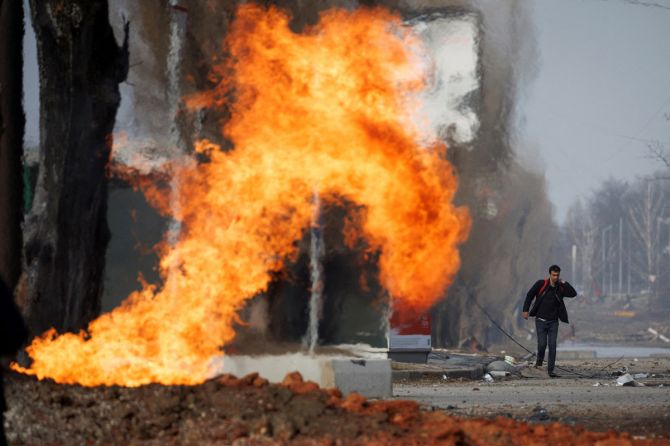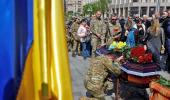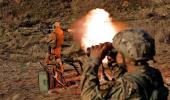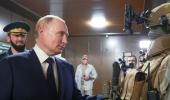'Russia is aiming at demoralising Ukraine as a nation.'
'They want to bomb the infrastructure, the electric stations so that regular citizens will not to be able to live, to cook, to give comfort to their kids.'

"I don't know if I will ever recover from depression and this impact of war," says Ukrainian director Lesia Diak.
Diak, 36, saw the consequences of war first-hand, when her partner joined the army and went to war against the Russians.
"He was destroyed (when he came back)," she says.
That experience made her film a documentary called Dad's Lullaby, based on how another war veteran finds it hard resume his normal life again. His family of a pregnant wife and three young sons struggle with him and his deep trauma. To make things worse, they can't even afford professional help.
The horrors of war are endless.
"There was this moment when a mother told me that she wants to show us something. She started showing a video of how her son died... that moment of a mother watching the video of the death of her son over and over again, it's from a completely different reality," Lesia tells Ronjita Kulkarni/Rediff.com in this heart-breaking interview.
What made you make this documentary, Dad's Lullaby?
I was in a relationship with a soldier. He worked with the paramedic team on a voluntary basis.
He was destroyed (when he came back). He couldn't find meaning in his life.
Because I was so deeply in love with him, I wanted to understand this. I wanted to find a family who was facing similar problems.

So what did you do?
I contacted a non-government organisation for war veterans in Ukraine. Through them, one woman volunteered to meet me.
It was the wife of my protagonist, Serhiy. She said she was facing similar issues in her family. She felt very unstable but wanted to save the marriage.
On the very first meeting, she was crying.
Filming with her family was a very intense experience.
After Serhiy returned from war, he was feeling euphoric and hopeful to begin a new life. They conceived a baby.
They hoped everything would be better but the stress of pregnancy and taking care of the kids caused him to face a lot of psychological issues, besides the issues he was already feeling.
He wanted to spend some time on his own in silence but the house was very noisy, with three boys.
They had to spend most of their time together, as they didn't have the resources to get out of that reality. Like, they didn't have resources to seek professional help or even to go on vacation.
Was he able to heal?
No. When I finished the movie, I asked him about going to a psychiatrist.
But he had reasons to doubt the quality of mental health support in Ukraine. He gave me the examples of his friends, also war veterans, who asked for support. But it was not high-quality service and caused them more damage.
The mental health professionals who are good, their service costs a lot of money. Serhiy couldn't afford it because he had to provide for his family.
But the situation is changing now. There are more and more programmes organised by communities that are focused on the mental health of war veterans.

When did you make this documentary?
I filmed for three years with breaks, from 2017 to 2019.
The war started in 2014, when Russia annexed Crimea and invaded the east of Ukraine.
Serhiy had to go back to war after the full-scale invasion in 2022, and that multiplied the damage. He was already broken and then he had to go back to war.
He was not a professional soldier. Before the war, he was responsible for the guards in a supermarket, and then later, a jewellery company.
So he knew how to handle weapons but was not mentally prepared for war.
He volunteered to join the army in 2015.
That's the destiny of many young people in Ukraine.
My ex-partner was a journalist and suddenly he had to become a soldier. It changed him forever.

What are their nightmares about?
My partner saw a young boy being killed by a bomb, when he was playing a video game on his phone.
When he saw the phone, it said, 'Level completed'. It was like the Russians bombs completed this level and killed him.
That traumatised him.
There was another case when he had to deliver a dead body, but they needed to hide from the shelling. It was this never-ending trip with a dead body.
It stayed with him.
He would see this nightmare that he's in the same situation, trying to deliver a dead body, and he can't.
Serhiy told me that it was very difficult for him to collect the remains of his comrades in a bucket. It's awful to realise that you are sharing the same space with a person, you are friends with this person, eating from the same plate, and the next day, you are collecting parts of his body.
You are also experiencing tremendous guilt because you could not protect them.
How did you deal with it?
I was in therapy for more than seven years. I still have depression.
I don't know if I will ever recover from depression and this impact of war.
I went to study abroad in 2021, and felt better to live in countries like Portugal, Belgium and Hungary where there was no war.
In 2022, Russia launched a full-scale invasion of Ukraine and the war was just everywhere.
It was impossible not to think about it.
It was very difficult to heal.
Non-stressful life doesn't exist for me anymore.

Dad's Lullaby is your first full length documentary but you have made shorts on war earlier as well.
I filmed a documentary called Wounds in 2022. It was during a rehabilitation programme for women who lost their husbands and sons.
There was this moment when one of the mothers told me that she wants to show something. She started showing a video of how her son died.
Some of his comrades had sent the video to her so that she knows the truth, and how her son died.
It's a video from a school where a soldier is filming the surroundings during a Russian attack. There were dead bodies, including the body of this son.
That left a mark on me because I wasn't actually prepared.
I knew it was a very tough subject but that moment of a mother watching the video of the death of her son over and over again, it's from a completely different reality.
There was another mom in this documentary, who lost not only her son but his entire family.
She is from the Chernihiv region, south of Ukraine.
Her son coincidentally was killed on the same day as his wife and teenage daughter.
The wife and daughter were trying to flee from Chernihiv but on the way, their car was shot.
This is a war crime because there are international rules even during war times but they were constantly violated.

Do you think Ukraine will be what it was ever again?
No. I want to be hopeful that we will find strength to move forward and rebuild our country, our economy and our culture.
But it will never be the same.
My friends from other countries constantly encourage me and say that the Russian war criminals will be put in prison. But it's difficult for me to imagine this optimistic scenario.
My ex-partner was destroyed because of the war. He couldn't find meaning in his life.
He could not control his anger.
So it's a little naive to imagine an optimistic image of the country after the war.

In your documentary, you have shown that children have become more aggressive after the war. Why is that?
When I was in therapy, one of the psychologists told me that aggression is a sign of pain.
That's how kids are processing this.
You know, they are not evil children, they are normal kids who are faced with abnormal circumstances and pain. That's why there is this anger and aggression, which they don't know how to control.
Serhiy's children were traumatised. Their father came back from war, and they were exposed to seeing him traumatised. This will stay with them forever.
This family now lives in Canada.
I am very glad that they are living in a peaceful country, and are finding ways to tame the aggression and anger.
But this is not the case of all Ukrainians.
A lot of families stayed back in our country because they don't have money to emigrate, because they want to stay home, because they don't feel secure enough to emigrate. It's also a challenge to be a foreigner in a different country.
Since Vladimir Putin seems unwilling to end the war, do you think Donald Trump will negotiate an agreement with him to end the war?
During his first term as president of the United States, Trump gave a lot of promises but never actually completed them.
He is the type of politician who sounds very ambitious and arrogantly confident.
As a Ukrainian and a person with critical thinking, I don't believe that Trump can negotiate easily and especially negotiate on the terms that will be okay for Ukraine.
I don't believe the war will be over with the power of negotiation of Donald Trump.

How did you become a film-maker?
My interest in cinema started at 17 when I was in university.
I wrote a thesis on cinema and how it can impact people.
When I was 24-25, I realised that I need to study film-making because that can give me a sense of freedom.
I wanted to build a career in cinema so that I could express something that I couldn't in other mediums. Also, because of Russia's aggression against Ukraine.
I started with documentaries because it's simpler. You don't need a script or a budget; you can start with your own money.
You moved from Ukraine to Lisbon.
Yes. For my creativity, it's a better place, where I'm not exposed to hiding in bomb shelters each night like my friends in Ukraine.
I visit Ukraine twice a year because the production company is based there.
Also, I need to feel this artistic link to the reality of my country. I need to meet people from there, see places with my own eyes because it's never enough to read the news.

How much has Ukraine changed since the war in 2022?
Everything is so, so, different.
I have a brother in Kyiv. He has a generator when there is no electricity, so he can still cook, make the house warm and function.
But my friend recently gave birth to a baby. She needs to provide some basic comfort for this toddler but if there is no electricity, there is no way to provide for the small child. It's difficult to live in a cold house without the possibility to cook warm food.
It's a very unpleasant reality.
Russia is aiming at demoralising us as a nation.
They are aiming at breaking our economical capacity.
They want to bomb the infrastructure, the electric stations so that regular citizens will not to be able to live, to cook, to give comfort to their kids.
This is their method of terror.
I'm talking, of course, about life in more peaceful parts of Ukraine. I don't know much about life in villages and cities that are bombed on a daily basis. It's more complex there.
Novo Poshta is a famous business in Ukraine. Russians hit Novo Poshta and killed several workers, who were just doing their job.
It's a huge responsibility (for the owner). On one side, you want your country to function and be prosperous. On the other, it's partially your responsibility that your workers are dead, and you have to communicate to their families about their deaths.
It's a very, very, complex reality.











